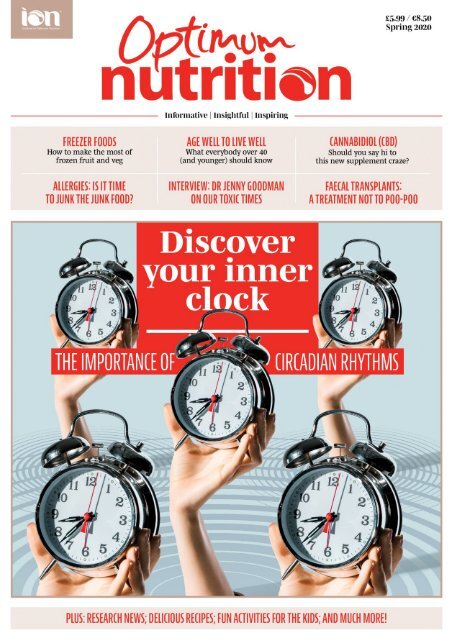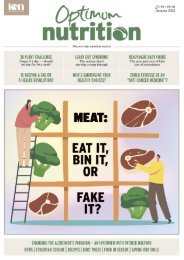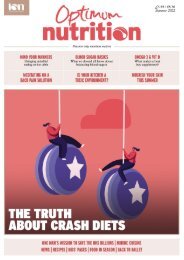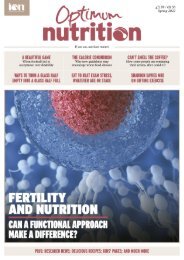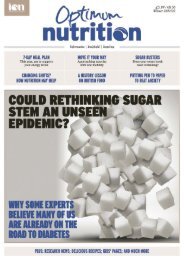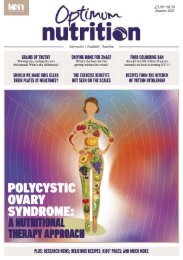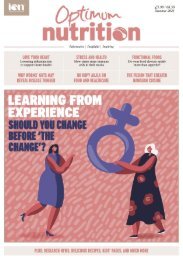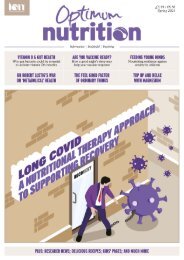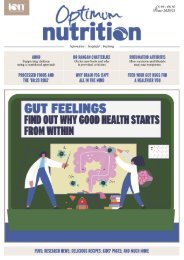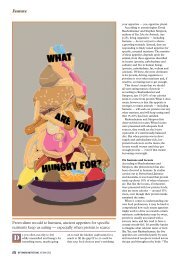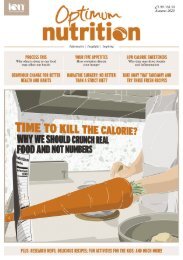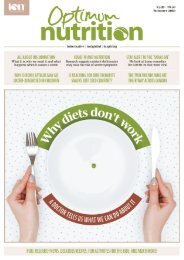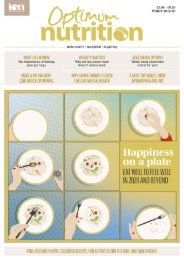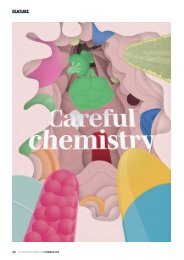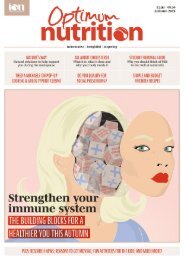Optimum Nutrition - Spring 2020 PREVIEW
Why your circadian rhythm is important for health and wellbeing | Age well to live well - what everyone over 40 (and younger) should know | The doctor who says our world is making us sick | Why junk food could be making your allergies worse | Making the most out of frozen fruit and veg | Could faecal transplants treat disease in the future? | Cannabidiol - should we say high to this new craze? | Plus kids' pages, recipes and more!
Why your circadian rhythm is important for health and wellbeing | Age well to live well - what everyone over 40 (and younger) should know | The doctor who says our world is making us sick | Why junk food could be making your allergies worse | Making the most out of frozen fruit and veg | Could faecal transplants treat disease in the future? | Cannabidiol - should we say high to this new craze? | Plus kids' pages, recipes and more!
You also want an ePaper? Increase the reach of your titles
YUMPU automatically turns print PDFs into web optimized ePapers that Google loves.
2 OPTIMUM NUTRITION | SPRING <strong>2020</strong>
THIS ISSUE<br />
8<br />
Are you in time with your inner rhythm?<br />
Louise Wates finds out about the so-called ‘body clock’ and why it is important for everything that we do<br />
12<br />
34<br />
It isn’t all downhill!<br />
We find out why age-related disease<br />
is not inevitable and how nutrition and<br />
lifestyle can improve our chances for a<br />
healthier older age<br />
25 Little lives<br />
Recent research reveals why soothers<br />
could be disrupting our children’s sleep,<br />
and how the impact of a sleepless night<br />
goes beyond the next morning<br />
Different strokes<br />
CBD oil can be found in drops, to capsules,<br />
to a morning coffee. But should we all be<br />
using it? Alice Ball finds out about this<br />
new and growing market<br />
46 All about<br />
Faecal transplants are the go-to treatment<br />
for Clostridium difficile infection, but can<br />
they be used for any other conditions?<br />
Elettra Scrivo writes<br />
Contents<br />
16 Interview<br />
Dr Jenny Goodman talks to us about her<br />
new book Staying Alive in Toxic Times and<br />
why all chemicals should be tested for<br />
their impact on human health<br />
28<br />
Little lives<br />
Intergenerational socialising boosts<br />
children’s learning and emotional<br />
development, and health and happiness in<br />
seniors, writes Catherine Morgan<br />
40 World cuisine<br />
Owner of Caribbean restaurant Caribe’,<br />
Keshia Sakarah talks to us about the<br />
flavours and colours of food from Trinidad<br />
— and shares a recipe, too<br />
20<br />
48 Move it 50<br />
Nursing her own injury, Giulia Basana<br />
finds out about exercise-induced knee<br />
injuries and why putting your feet up may<br />
be the best route to recovery<br />
42<br />
Research update<br />
A roundup of recent research into<br />
domestic chemicals and their impact on<br />
health; on p.22 why research into allergies<br />
suggests it is time to junk the junk food<br />
30<br />
On your plate<br />
Three easy and mouth-watering recipes<br />
from The 28-Day Pegan Diet, by food writer<br />
Isabel Minunni and nutritionist Aimee<br />
McNew<br />
Food fact file<br />
Whilst we are told that fresh fruit and<br />
vegetables are the basis for a healthy diet,<br />
they are not always available. We find out<br />
about the benefits of frozen produce<br />
Graduate story<br />
Kate Cook tells us how a desire to do a<br />
‘little’ course in nutrition led to a new<br />
career running workshops and corporate<br />
wellness programmes<br />
04 Comment / news | 26 Kids’ pages | 45 Book therapy<br />
37 Product news | 38 Kitchen chemistry | 39 In season<br />
SPRING <strong>2020</strong> | OPTIMUM NUTRITION<br />
3
FEATURE<br />
On 29 March, the clocks went forward for British Summer<br />
Time — a simple, annual change that can leave many of us<br />
feeling out of sorts. Louise Wates finds out why our natural<br />
circadian rhythms are so important for health and wellbeing<br />
8 OPTIMUM NUTRITION | SPRING <strong>2020</strong>
FEATURE<br />
W<br />
hen our ancestors discovered<br />
fire, did teen cave people refuse<br />
to go to their animal skin blanket<br />
and adults start staying up late just to<br />
binge watch pictures in the flames?<br />
Maybe not, but as a species we do tend to<br />
fight with Mother Nature.<br />
Yet increasingly, research indicates that<br />
although we can take the person out of<br />
the cave, we can’t take the cave out of<br />
the person. Even for so-called ‘night owls’<br />
there is an inner early human in all of us<br />
with a biological clock that is hard-wired<br />
to the rhythms of the day. One study<br />
looking at neural signatures of sleep has<br />
hypothesised that they may have evolved<br />
at least 450 million years ago, long before<br />
our ancestors crawled out of the ocean. 1<br />
And it appears that going against this<br />
biological clock could be fuelling much of<br />
the health problems that we see today.<br />
This may be hard to swallow, especially<br />
for those who happily follow irregular<br />
bedtimes or mealtimes. Yet increasingly,<br />
experts warn that ignoring our circadian<br />
rhythms may contribute to a range of<br />
diseases such as obesity, type 2 diabetes,<br />
fatty liver disease, depression, anxiety, and<br />
even Alzheimer’s.<br />
Consultant neurologist and sleep<br />
consultant Dr Guy Leschziner told<br />
<strong>Optimum</strong> <strong>Nutrition</strong>: “For most people, there<br />
is a clear circadian rhythm, a 24 hour cycle<br />
defined by an area of the brain called the<br />
suprachiasmatic nucleus. But this master<br />
clock coordinates circadian rhythms in all<br />
other organs in the body, and when there<br />
is misalignment between our behaviour<br />
and other physiological processes, there<br />
is evidence that this results in physical<br />
harms, including metabolic issues, immune<br />
dysregulation and even increasing the risk<br />
of cancer.”<br />
This is bad news for shift workers. “Shift<br />
work disorder has even been listed as a<br />
possible carcinogen by the World Health<br />
Organization,” he says. “So it is likely that<br />
fighting against your intrinsic circadian<br />
rhythm is deeply unhealthy.”<br />
The interest in body clock and health<br />
has developed into a whole area of<br />
research called chronobiology. One<br />
recent study even suggested that after<br />
surgery, giving anti-inflammatories in<br />
the morning and analgesic painkillers<br />
in the evening works better with the<br />
body’s circadian rhythm. 2 This is because<br />
inflammation, which is important to the<br />
healing process, signals for cells to repair<br />
tissue. It was hypothesised that giving<br />
anti-inflammatories at night, when the<br />
healing is underway, would interfere with<br />
this process. When researchers compared<br />
bone healing in two different groups<br />
of mice, it was found that mice given<br />
anti-inflammatories in the morning and<br />
analgesics at night, as opposed to antiinflammatories<br />
round the clock, recovered<br />
from the pain of the injury, and regained<br />
bone strength more quickly and more fully.<br />
Circadian rhythm<br />
Although we usually speak of a single<br />
‘body clock’, it has been suggested that<br />
different organs have their own circadian<br />
rhythm. Research last year on mice even<br />
suggested that some of these circadian<br />
clocks may work independently of the<br />
brain. After shutting down the entire<br />
circadian clock before jump starting those<br />
for the liver and skin, scientists found<br />
that these circadian clocks responded<br />
to light independent of the brain. 3,4 In<br />
other research, it was found that a type of<br />
immune cell helps to keep time in the gut;<br />
potentially explaining why disruption to<br />
eating patterns can cause gastrointestinal<br />
problems. 5<br />
It perhaps even seems logical that<br />
different parts of the body should have<br />
their own rhythm — because the body<br />
cannot do everything all at the same<br />
time. For instance, we can’t eat, exercise<br />
and defecate all at the same time — or<br />
if we can, we probably shouldn’t. This is<br />
because the body focuses resources on<br />
the task in hand; if we are feeling anxious<br />
we are unlikely to be wondering what to<br />
have for lunch. This is because whilst we<br />
are in fight or flight mode, the digestive<br />
system temporarily shuts up shop — it<br />
would be hard to eat whilst running from a<br />
sabretooth tiger.<br />
Hormones are important for this. Before<br />
we wake up, our so-called ‘stress’ hormone<br />
cortisol rises and peaks, enabling us to<br />
start the day by drawing on stored energy<br />
so that we don’t have to function on empty.<br />
This is triggered by daylight; and at the end<br />
of the day, reduced light triggers secretion<br />
of a hormone called melatonin, which<br />
makes us sleepy.<br />
Response to light<br />
According to a recent study of cells<br />
taken from the eyes of deceased human<br />
donors, three types of cells (which<br />
are not involved in sight) responded<br />
when exposed to light; 6 firing after just<br />
a 30-second pulse of light. When the<br />
light was turned off, some of the cells<br />
took several seconds to stop firing. The<br />
discovery is thought to explain why some<br />
blind people have a body clock that follows<br />
a day-night cycle even though they cannot<br />
see. It also demonstrates how light is a<br />
stimulant to the human body at a cellular<br />
level.<br />
The importance of sleep<br />
Good quality sleep — something many of<br />
us are short on — is vital to the circadian<br />
rhythm. During sleep, the body undergoes<br />
a range of housekeeping chores, healing<br />
and repairing. For example, one study<br />
published this year 7 reports that a type of<br />
collagen that is important to connective<br />
tissue is broken down and replenished<br />
during sleep. So when we don’t get<br />
enough sleep, the body doesn’t get to<br />
carry out all its tasks efficiently.<br />
Also, at the very least, it is known<br />
that tiredness makes us crave highcalorie<br />
foods, which are then processed<br />
differently. More nutrients eaten when<br />
tired end up being stored as fat, so even<br />
if we eat the same foods as when rested,<br />
we are more likely to gain weight. This is<br />
why some experts recommend that we try<br />
to sleep and eat according to those ancient<br />
rhythms; getting as much daylight as<br />
possible during the day, quality darkness at<br />
night, and avoiding eating when our bodies<br />
are preparing for sleep.<br />
Late night eating has also been<br />
associated with poorer health long-term. In<br />
one small study of 112 women, presented at<br />
the American Heart Association’s (AHA)<br />
Scientific Sessions in November 2019, it<br />
was reported that women who ate a higher<br />
proportion of their daily calorie intake later<br />
in the evening were more likely to be at<br />
greater risk for cardiovascular disease. The<br />
AHA said that each one per cent increase<br />
in calories consumed in the evening<br />
increased the likelihood of higher blood<br />
pressure and body mass index, and poorer<br />
long-term control of blood sugar.<br />
In an AHA statement, lead study author<br />
Nour Makarem, PhD, said: “So far, lifestyle<br />
approaches to prevent heart disease have<br />
focused on what we eat and how much<br />
we eat. These preliminary results indicate<br />
that intentional eating that is mindful of<br />
the timing and proportion of calories in<br />
evening meals may represent a simple,<br />
modifiable behaviour that can help lower<br />
heart disease risk.”<br />
Diet, dopamine and disruption<br />
Whilst artificial light and a wealth of<br />
distractions act to disrupt our circadian<br />
rhythm, what we eat can also play a<br />
“...intentional eating that is mindful of the timing and proportion<br />
of calories in evening meals may represent a simple, modifiable<br />
behaviour that can help lower heart disease risk”<br />
SPRING <strong>2020</strong> | OPTIMUM NUTRITION<br />
9
INTERVIEW<br />
Staying Alive in Toxic Times:<br />
meet the doctor who says the<br />
modern world is making us ill<br />
MAIN AUTHOR PHOTO (c) Liz Seabrook<br />
Dr Jenny Goodman talks to Louise Wates about why she was driven to write a book on the<br />
chemicals that surround us, and how lifestyle can help to reduce their impact on health<br />
16 OPTIMUM NUTRITION | SPRING <strong>2020</strong>
INTERVIEW<br />
F<br />
or those who haven’t seen the<br />
film Dark Waters, there is a scene<br />
in which the main protagonist<br />
Rob Bilot, played by Mark Ruffalo, is found<br />
ripping up carpets and throwing cooking<br />
pans into the rubbish — before his wife,<br />
played by Anne Hathaway, yells at him to<br />
stop. I shan’t ruin it with spoilers, but the<br />
film is based on the real-life story of lawyer<br />
Rob Bilot who spent two decades fighting<br />
one of America’s largest corporations over<br />
the dumping of toxic waste. It was roughly<br />
when I saw the film that I also spoke with<br />
Dr Jenny Goodman. A UK-based doctor<br />
who practises ‘ecological’ medicine,<br />
Goodman is a long way from Hollywood<br />
but her message isn’t too different from<br />
that of Dark Waters. Her book Staying Alive<br />
in Toxic Times: A Seasonal Guide to Lifelong<br />
Health lists and discusses the chemicals<br />
that surround us in everyday life. But unlike<br />
Dark Waters, she also tells us what we can<br />
do to lessen the damage.<br />
The ‘toxic overload’ debate — the<br />
concept that we live in a chemically-loaded<br />
environment that we didn’t evolve for — is<br />
a controversial one. Many experts argue<br />
that toxins are usually at ‘safe’ levels; for<br />
example, pesticide residues on food. The<br />
other side of the debate, however, is that<br />
those pesticide residues, added to all<br />
the other chemicals in our environment,<br />
create an unhealthy cocktail. Pollution<br />
from vehicles, chemicals in food packaging<br />
or plastic bottles, or cigarette smoke are<br />
well known examples. Goodman’s book<br />
includes many more, stating that these<br />
chemicals are making us — or some of us,<br />
at least — sick; triggering health problems<br />
including neurological disturbances,<br />
autoimmune conditions and cancer.<br />
Goodman and I speak on the phone.<br />
As we talk, she occasionally refers to<br />
academic studies so that I can check her<br />
facts. My impression is that she either<br />
has an excellent memory or is superfast<br />
at thumbing through lists of journal<br />
references. It’s also a reminder that despite<br />
the rather (in my opinion) ‘softly softly’<br />
approach cover of her book, Goodman<br />
comes from a science background. She<br />
qualified as a doctor in 1982 but became<br />
disillusioned because medical training<br />
did not tell her how to help prevent<br />
disease. She writes that on the wards,<br />
the profession focused on suppressing<br />
symptoms “using a vast array of drugs”.<br />
(Goodman, p.2) In the 1990s, she<br />
discovered the British Society for Ecological<br />
Medicine (BSEM) — a form of practice also<br />
known as functional medicine — where,<br />
she writes, she encountered other doctors<br />
who were also disillusioned with dishing<br />
out drugs.<br />
Joining BSEM, she says, meant<br />
rethinking some of her training. “I had an<br />
awful lot to unlearn. I was to some extent<br />
still in the conventional mode. I thought<br />
purely in diagnostic terms — you’ve got<br />
disease X or you haven’t,” she says. “And if<br />
your symptoms don’t fit any pattern in my<br />
textbook then you haven’t got a disease,<br />
ergo you must be well. Of course, we know<br />
that isn’t the case. We know there is a vast<br />
spectrum between health and [a named]<br />
illness.”<br />
Many people can be quite ill, she says,<br />
but with symptoms that haven’t quite<br />
made it into the textbooks. She says she<br />
also had to unlearn the notion of aetiology.<br />
“In medical textbooks, under each disease<br />
there is a section called ‘aetiology’ which<br />
means ‘cause’. It’s always a very small<br />
section.<br />
“I had to learn that what conventional<br />
medicine gives as a cause — which is what<br />
is happening in the tissues, in the cells — is<br />
a mechanism, not the cause.”<br />
Another difference between<br />
conventional medicine and how she<br />
practises, she says, is that rather than<br />
saying nothing is wrong, because the<br />
patient’s symptoms don’t fit into a<br />
textbook, she will say ‘I don’t know what<br />
is wrong’ before investigating. Much of<br />
Goodman’s approach involves nutrition<br />
because, she explains, many chemicals<br />
“push” nutrients out of the system.<br />
However, nutrition as medicine is not<br />
largely accepted by the wider medical<br />
...toxins are driving... diseases including: “Acne, addictions, ADHD,<br />
allergies, anxiety, arthritis, asthma, autism and ASD, auto-immune<br />
diseases, cancer, chronic fatigue syndrome/ME, dementia,<br />
depression, diabetes, eczema, endometriosis, fertility problems,<br />
fibroids, hay fever, heart disease, hyperactivity, inflammatory bowel<br />
disease, irritable bowel syndrome, lupus, motor neurone disease,<br />
multiple sclerosis, obesity, Parkinson’s disease, period problems and<br />
PMS, polycystic ovaries, stroke, thyroid problems”<br />
“The gastroenterologist who — if you pardon the pun — poo pooed the<br />
idea of the microbiome is probably dishing out probiotics on the NHS”<br />
profession, and it is unlikely that many<br />
of us would get similar information<br />
from our GPs. This, she says, is because<br />
conventional medicine is “slow to catch<br />
up”. In her book there is the example<br />
of a gastroenterologist who, about six<br />
years ago, told a patient that food made<br />
no difference to the state of their gut.<br />
“The gastroenterologist who — if you<br />
pardon the pun — poo pooed the idea of<br />
the microbiome is probably dishing out<br />
probiotics on the NHS in the six years<br />
since that comment was made,” she says.<br />
“[Medical understanding is] changing<br />
rapidly but of course myself and my<br />
colleagues will never ever get the credit,<br />
because once the mainstream knows it, it’s<br />
like they always knew it.”<br />
Generally, it appears that GPs are<br />
nonplussed when she works with their<br />
patients. Asked how they respond to her<br />
recommendations, she replies: “On the<br />
whole just blank. Research that is known<br />
about in the academic sphere does take<br />
time to trickle down to the clinical world.”<br />
She mentions small intestine bacterial<br />
overgrowth (SIBO) and leaky gut (intestinal<br />
hyperpermeability) as two examples<br />
that have only recently entered into the<br />
consciousness of conventional medicine.<br />
Where Goodman and like-minded<br />
practitioners continue to stand apart<br />
from conventional accepted wisdom is<br />
on the belief that environmental toxins<br />
are driving growing rates of modern<br />
diseases including: “Acne, addictions,<br />
ADHD, allergies, anxiety, arthritis, asthma,<br />
autism and ASD, auto-immune diseases,<br />
cancer, chronic fatigue syndrome/ME,<br />
dementia, depression, diabetes, eczema,<br />
endometriosis, fertility problems, fibroids,<br />
hay fever, heart disease, hyperactivity,<br />
inflammatory bowel disease, irritable<br />
bowel syndrome, lupus, motor neurone<br />
disease, multiple sclerosis, obesity,<br />
Parkinson’s disease, period problems and<br />
PMS, polycystic ovaries, stroke, thyroid<br />
problems.” These diseases, she writes are<br />
“21st century plagues, which were rare or<br />
unknown before the industrial revolution.<br />
They are not inevitable and they are not<br />
primarily about ageing.” (Goodman, p.8)<br />
The fact we are living longer, she<br />
believes, is not to blame. “There’s a lack<br />
of logic in the argument that says thanks<br />
to the wonders of modern medicine we’re<br />
now living long enough to get hideous<br />
diseases,” she says. “Alzheimer described<br />
what he called pre-senile dementia. His<br />
first patient was 51. In your nineties you’re<br />
going to forget people’s names, but in<br />
SPRING <strong>2020</strong> | OPTIMUM NUTRITION<br />
17
ON YOUR PLATE<br />
Beet chip nachos<br />
with refried lentils<br />
Serves: 4<br />
Isabel and Aimee say:<br />
“These colourful nachos are delicious!”<br />
Ingredients<br />
Beet chips<br />
• 3 beets, preferably in different colours<br />
• 1 tbsp olive oil<br />
• ½ tsp sea salt<br />
• ½ tsp pepper<br />
Refried lentils<br />
• 1 cup lentils (approx. 250 g)<br />
• 4 tbsp olive oil<br />
• 3 tbsp red pepper, minced<br />
• 2 tbsp onion, minced<br />
• 2 garlic cloves, minced<br />
• ½ tsp cumin<br />
• ½ tsp sea salt<br />
• ½ tsp pepper<br />
Toppings<br />
• ½ cup romaine lettuce, chopped<br />
• 1 jalapeño, sliced<br />
• ½ cup salsa<br />
• 2 tsp chives, sliced<br />
• Drizzle of avocado crema (see below for<br />
recipe)<br />
Avocado crema<br />
• 2 ripe avocados<br />
• ¼ cup chopped coriander (cilantro)<br />
• 1 lime, juiced<br />
• 2 tbsp avocado oil<br />
• ¼ tsp sea salt<br />
• ¼ tsp cumin<br />
Method<br />
Preheat oven to 180C/350F/gas 4.<br />
Using a mandoline, thinly slice the<br />
beets. Line a cookie sheet with parchment<br />
paper and brush with olive oil. Place<br />
beets in a single layer onto cookie sheet<br />
and brush beets with remaining oil.<br />
Place in preheated oven and bake for 15<br />
to 20 mins. Remove from the oven and<br />
immediately season with salt and pepper.<br />
Rinse lentils in cold water. Look for<br />
and remove any debris, then drain. Place<br />
lentils in a medium saucepan with enough<br />
water to cover lentils. Heat over mediumhigh<br />
heat and boil lentils until tender,<br />
about 15 to 20 mins.<br />
Heat a frying pan over medium heat.<br />
Coat with oil and cook the onion and<br />
pepper until soft, about 2 mins. Add in<br />
garlic and cook another minute. Season<br />
with cumin, salt and pepper.<br />
Drain the cooked lentils and add them<br />
to the frying pan. With a hand-held potato<br />
masher, mash the lentils until half are<br />
broken up and mashed.<br />
Place all crema ingredients in a blender<br />
and blend until smooth.<br />
Arrange the beet chips on a serving<br />
platter and top with lentils, lettuce,<br />
jalapeño, salsa, chives and a generous<br />
drizzle of avocado crema.<br />
SPRING <strong>2020</strong> | OPTIMUM NUTRITION<br />
31


